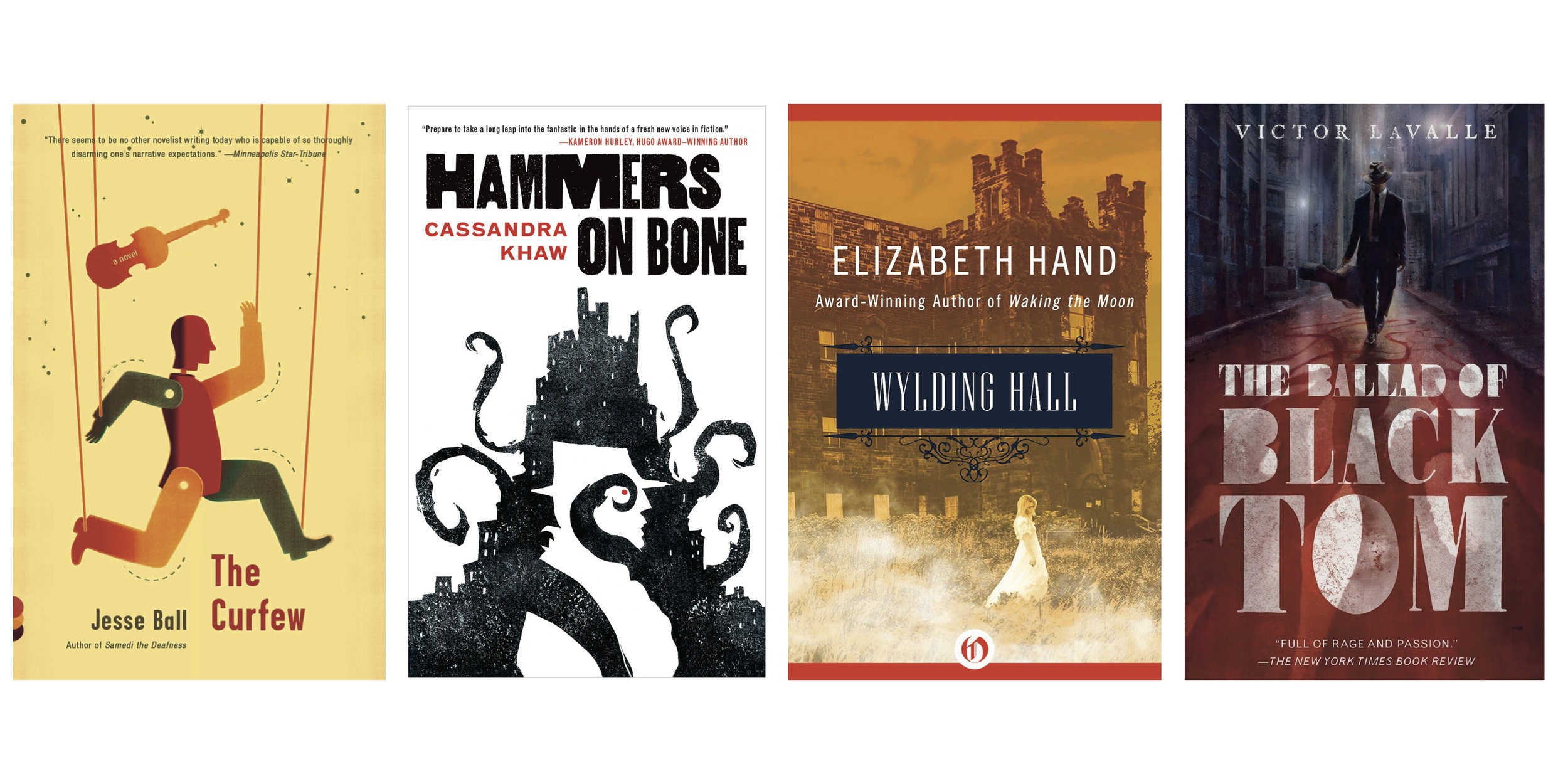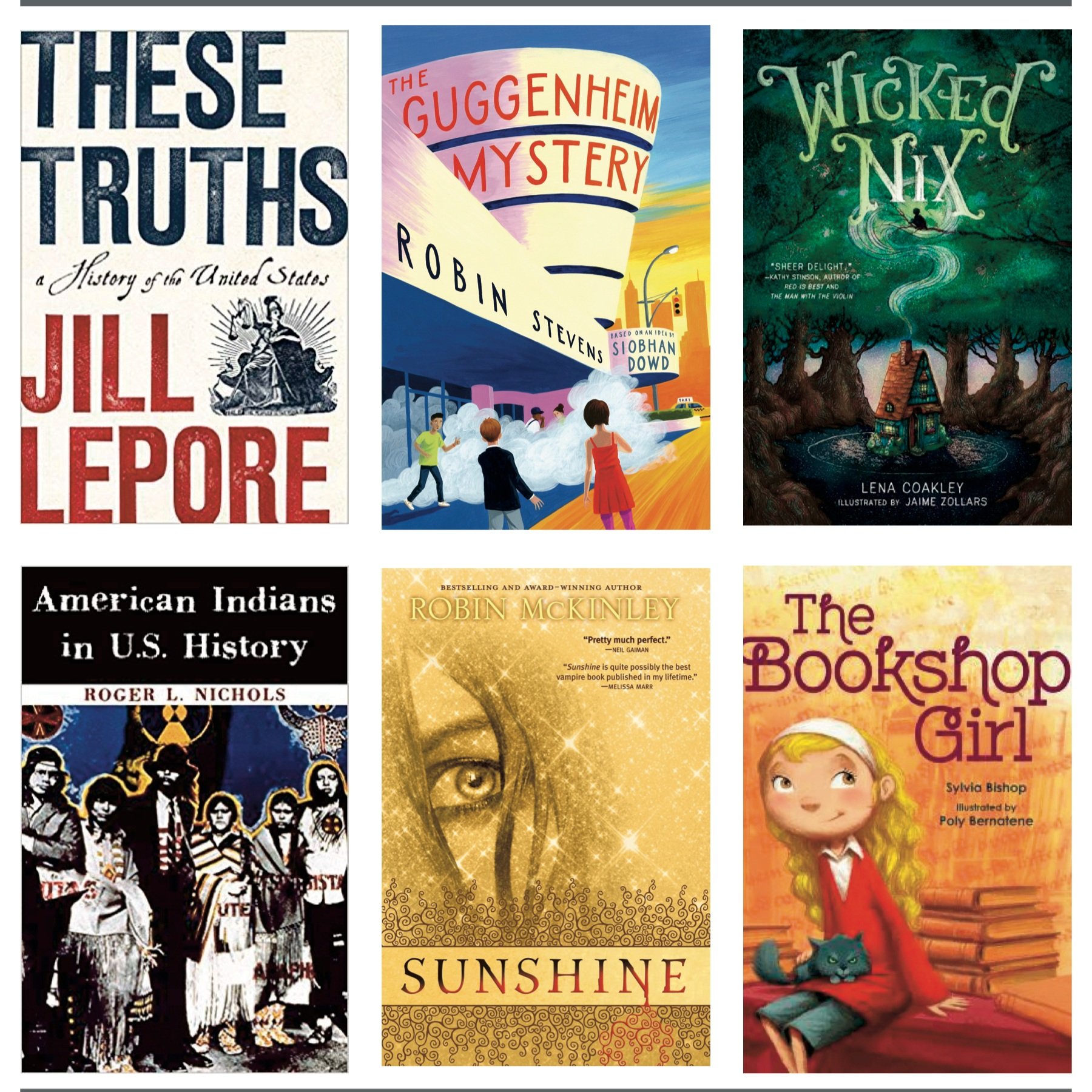What I’m Reading: 1.23.19
The classes I teach started back this week, so my reading habits definitely reflect that!
Larklight by Philip Reeve
My son and I are reading this together, and it’s kind of a case study in how different the same book can be with different kids — my daughter, when we read it together, was skeptical: “It’s like Charles Dickens but with space pirates?” My son, this time around, was delighted, “It’s like Charles Dickens but with space pirates!” Note to self: Find more steampunk graphic novels.
Meddling Kids by Edgar Cantero
I’m glad I don’t try to give star ratings for books because I would have a really hard time figuring out a rating for this book. On the one hand, sign me up, I am all in for a Scooby Doo-Lovecraft mashup, and this book absolutely delivers on that front. There are tons of wink-wink, nudge-nudge references to classic Scooby mysteries and other plucky detectives (“Nancy Hardy, girl reporter”), and while they’re maybe a little overdone by the time you get to the last quarter of the book, mostly they are delightful. And the story is great: A gang of kids famous for their summer detective work are still — more than a decade later — dealing with the repercussions of their last case, which is much darker than they like to remember. Tough-as-nails former tomboy Andy and former kid genius-turned-bartender Kerri team up to break former comic relief sidekick Nate out of an asylum (where he’s committed himself because he sees the ghost of the late team leader) and head back to finally solve the mystery that still haunts them.
I loved the structure of the book, which hops around between perspectives and literary styles, occasionally breaking the fourth wall, anthropomorphizing random objects, and shaking things up with metafictional transitions. I know this can get annoying, and your tolerance may be lower than mine, but I found it perfectly suited to the wacky storyline.
I did run into some bumps: Like a lot of people, I didn’t love the treatment of LGBTQ people in this book, which seems superficially fine but gets more problematic the more you look at it. And there were places where the tongue-in-cheek charm felt like it was just trying a little too hard — it felt more forced than funny. Overall, it was more hit than miss for me, but there were definite caveats.
Bellweather Rhapsody by Kate Racculia
This one, I loved. I picked it up because it won the Alex award (almost always a sign of a book I will like) and because of a review that called it a mashup of Glee and The Westing Game. Who could resist that? Of course, no book could live up to that comparison, and this one doesn’t, but that’s okay because I found it pretty delightful anyway.
The Hatmaker twins, Rabbit and Alice, have been selected for the annual Statewide high school music festival. Among the throngs of musical teenagers, a young woman is returning to the Bellweather for the first time since she witnessed a murder-suicide there 15 years ago. Minnie wants to face her demons, Alice wants to be a star, and Rabbit wants to finally tell his sister that he’s gay, but none of them is prepared for what happens when Alice’s roommate disappears under mysterious circumstances. That’s an oversimplification of a complicated plot that also includes a conductor with a damaged hand, an evil music director, a teacher recovering from a deadly home invasion, and a concierge who has never gotten over that murder fifteen years ago. There’s a lot going on, but as you would expect in a novel about an orchestra, all the different themes weave together in a satisfying harmony. I kind of loved it.
Rose Daughter by Robin McKinley
I told you not to read this one right after Beauty, and then I went and did it anyway! I think the recommendation stands, but Rose Daughter is a lovely, dreamy story. I do love that McKinley subverts many of the fairy tale conventions in this story: Beauty’s sisters are brave, kind, and intelligent; there’s almost no mention of Beauty’s physical appearance at all; and the spell on the Beast is weirdly metaphysical. I like Beauty better, still, but this one’s lovely.
Sherlock Holmes: The Major Stories with Contemporary Critical Essays edited by John A. Hodgson
I’m gearing up for my Sherlock class, so rereading these was essential. I’m teaching “A Case of Identity,” which I enjoy teaching because I get so angry with Holmes denying the solution to his client; “The Speckled Band,” which is a great opening to talk about Victorian Orientalism; and “A Scandal in Bohemia,” which is just great fun. I’ve obviously got a loose women-in-the-Holmes-canon thing going on, but to me, that’s one of the most interesting pieces of the Sherlock Holmes narratives.
The Storm Keeper’s Island by Catherine Doyle
Cogheart by Peter Bunzl
If I have a literary pet peeve — who am I kidding? I have a list of literary pet peeves! But one of them is books that end without a satisfying resolution. I don’t love cliffhangers, but I understand the point of them, and I’m never going to complain if a book doesn’t wrap every single thing up in a neat bow. (In fact, books that do that are often unsatisfying in a different way.) As Melville wrote, truth uncompromisingly told will always have its ragged edges. I can appreciate a ragged edge. What I don’t like is investing my time, energy, and interest in reading a book that just ends.
The Storm Keeper’s Island was kind of that book. I loved the set up: An island off the coast of Ireland is home to an ancient magic and a group of families who protect the world from the evil forces buried within it, and Fionn Boyle — still traumatized by the death of his father — is the top candidate to take over for his grandfather as Storm Keeper. There’s a lot of mystery and adventure, a little time traveling, and a lovely relationship that develops between Fionn and his grandfather. But then the book just ends — almost none of the threads that you’ve been following resolve. And that’s when you realize: Nothing has really happened. All this set-up has been for the sequel, not for this book. It feels like reading half a book. There were a lot of things I liked about this book, but I’m not sure I’ll pick up the sequel because the end was so disappointing. It just stopped.
On the other hand, there’s a sequel to Cogheart, and I plan to scoop it up, stat — not because it left me hanging but because I’d love to revisit Lily and Robert’s world. There are loose ends in Cogheart, but the story feels finished: Lily’s inventor father has vanished after an attack on his ship, and Lily, her mechanical fox, and their new ally Robert, a clockmaker’s son, set out to rescue him. Middle grades steampunk always seems to hit the sweet spot for me — it glides over the technological marvels with just enough detail to make them seem wonderful but focuses most of its energy on storytelling and character building. I liked this so much I flipped back to the first page to read it over again immediately after I finished — it’s just a delight. (And I do want to know what plucky airship captain/investigative reporter Anna is up to at the end of the book!)
The Deceivers by Kristen Simmons
It’s about a fancy boarding school for grifter teens, you guys. If that is up your alley, you will dig this book. If not, steer clear. I found it fun and funny — not a great book but a totally enjoyable read. (Apparently the author intended it as a riff on Norse mythology, but I did not get that at all.)
The Dead Queen’s Club by Hannah Capin
I did get the riff in this one, which plays with the Henry VIII story, but you’d have to have completely skipped British history not to get it. In this take, Henry is a small-town football hero with a chip on his shoulder, who dates his way through a succession of girls who echo the Tudor queens, some of whom end up suspiciously dead. The story is narrated by Cleves (so-nicknamed because she hails from Cleveland), Henry’s BFF and — for 15 days — his fourth girlfriend. Gradually, Cleves starts to suspect that Henry’s bad luck with the ladies may be his own fault, and she teams up with his other surviving girlfriends to discover the truth about what really happened to Anne and Katie. It’s a fun idea, though it lags a bit in the telling and it has plenty of plot holes.
(We’re Amazon affiliates, so if you purchase something through an Amazon link, we may receive a small percentage of the sale. Obviously this doesn’t influence what we recommend, and we link to places other than Amazon.)
































AMY SHARONY is the founder and editor-in-chief of home | school | life magazine. She's a pretty nice person until someone starts pluralizing things with apostrophes, but then all bets are off.